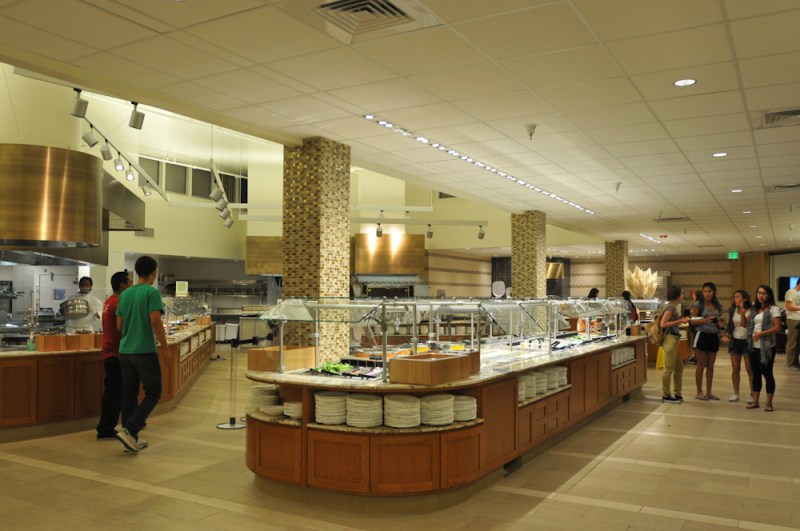As Stanford’s response to the COVID-19 outbreak intensifies, both union leaders and student activists are calling on the University to better protect, inform and compensate its workers.
Custodial and dining hall staff have taken on additional work as part of the University’s efforts to increase sanitary conditions in campus residences and inhibit the spread of COVID-19.
Residential and Dining Enterprises (R&DE) policy now requires staff to replace utensils every 15 minutes and sanitize dining spaces more frequently, according to guidelines included in a March 4 email from R&DE dining director Eric Montell.
Custodial work has also been elevated to a “level-one directive,” meaning workers must enforce enhanced sanitary measures.
To protect themselves and others, workers who are feeling sick or caring for sick family members have been instructed by R&DE to use paid sick leave to stay home, according to Undergraduate Senator Tim Vrakas ’21. Stanford’s “Information for staff” webpage also instructs employees who cannot telecommute to follow the Centers for Disease Control and Prevention’s guidance on flu prevention.
“When these measures are practiced with diligence they are an effective means for minimizing the spread of the disease,” the page reads.
But union leadership and student activists say that additional resources, protections and trainings are necessary so that custodial and food service workers can better protect themselves and the campus community.
Stanford Students for Workers’ Rights has proposed measures meant to protect workers during the COVID-19 outbreak, including providing workers additional paid sick leave during the outbreak, instating a 25% wage premium and hiring full time “floater” positions to support understaffed departments.
A petition in support of the group’s proposals has received more than 700 signatures as of Monday night. Additionally, the group is urging signees to email the proposals to University administrators.
“The custodians are taking on disproportionate risk with respect to the outbreak, and they’re the ones who are keeping us safe,” said Ethan Chua ’20, a member of Stanford Students for Workers’ Rights. “But is that reflected in the wages they get? Not at all.”
Under their current contract, union workers do not receive hazard pay, so staff taking on additional responsibilities will be paid according to existing overtime rates, according to Jose Escanuela, president of Service Employees International Union (SEIU) Local 2007.
Chua said instituting the combination of a temporary wage bump and additional sick leave is the most important measure Stanford Students for Workers’ Rights is proposing.
“If you just have the wage increase, you don’t want to financially pressure workers into working in unsafe conditions,” he said. “But neither do you want to tell workers, ‘Okay, you’re safe.’ But if your livelihood really depends on you having a stable job, what then? So those two work in tandem.”
The University has not responded to multiple Daily requests for comment.
Additionally, Chua expressed frustration that campus workers may not be adequately informed about the extent of coronavirus on campus. He said he and other student-activists had spoken with workers in residential facilities and found some did not know about the confirmed COVID-19 case in the medical school, or that cases were being treated at the Stanford hospital.
Escanuela said that while all SEIU 2007 workers receive the same campus-wide emails as students do, some may not check their email regularly. Additionally, a March 6 email from Associate Vice Provost for Environmental Health and Safety Russell Furr noted that “some members of our university community did not receive recent email updates that were sent to the entire community regarding COVID-19.” It is unclear whether campus workers were affected.
At a meeting with Stanford administrators on Friday, SEIU 2007 leadership brought up the challenges of disseminating information via email and requested that the University use pre-existing departmental meeting times to give in-person updates and safety precautions, Escanuela said.
“What we told Stanford [at the meeting] on Friday was there is still very little information out there as to how to take care of yourself,” he said.
During the meeting, union leadership also requested that sick-leave policies be amended during this time to ensure that sick workers did not feel pressured to come into work.
The University told SEIU 2007 that it would get back to the union shortly regarding the proposed changes.
So far, workers who staff on-campus events have been most affected by the University’s response plan, according to Escanuela. Following a March 3 announcement from Furr, all gatherings of more than 150 people have been canceled or postponed.
“That’s a large group, we’re talking about almost 150 workers total, who may potentially see a layoff just because of the nature of the work that they’re dependent on: the catering and the event operations, which are minimal [now],” Escanuela said.
Union leadership has urged the University to temporarily reassign these workers to departments bearing the brunt of Stanford’s response to the outbreak, according to Escanuela.
Chua said that the COVID-19 outbreak had revealed “systemic issues” related to the role that workers play within the campus ecosystem.
Due to affordability and housing issues, Chua said, Stanford faces chronic challenges in hiring enough workers. The result, he added, is that an already overworked custodial and food service staff is acting as the University’s first line of defense against the virus.
But Escanuela was optimistic that workers’ increased efforts protecting against the spread of COVID-19 would be recognized.
“There is a glimmer of hope,” he said. “Sometimes when our members are asked to go above and beyond, the departments will reach out to the union after everything is okay and say, ‘Hey, you know what, we’d like to recognize your members with a bonus.’ And, you know, maybe this extraordinary effort will be rewarded like so.”
Contact Grace Carroll at gac23 ‘at’ stanford.edu.
